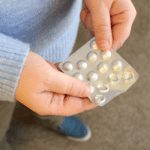Risperidone (Risperdal) for Mental Health: How It Helps


If you’re thinking about starting to take Risperidone (brand name, Risperdal), you’re likely to have some questions about how it works and how it will impact you.
Although medications treating psychiatric illnesses can be life-changing, that’s not to say the journey is without difficulty. Starting and stopping medication can come with side effects, dosage experimentation, and questions about alternative options.
To clarify key details about this medication, this page will explain:
- The conditions Risperidone can treat
- How Risperidone works
- Both common and rare side effects, and how you can manage them
- How it might feel to withdraw from Risperidone, and how to do it safely
- Alternatives to Risperidone
- Some frequently asked questions about Risperidone
Without further ado, let’s get started.

What Is Risperidone Used For?
Risperidone is an antipsychotic medication prescribed to treat conditions such as schizophrenia and bipolar 1 disorder, as well as autism (if the symptom of irritability is severe). It can be an effective treatment for these as it can alleviate symptoms like aggression, mood swings, hallucinations, and delusions.
The FDA has approved Risperidone for schizophrenia in patients over the age of 13 and for autism-associated irritability in children aged 5 or over. When prescribing Risperidone for bipolar disorder 1 (people experiencing manic or mixed episodes), it can be taken on its own by adults and children over the age of 10 or alongside valproate or lithium by adults only.
Risperidone’s off-label uses include treating borderline personality disorder, depression, conduct disorder, and speech disorders, to name a few. Plus, it’s also used to treat agitation and aggression in patients with dementia.1
How Does Risperidone Help?
Risperidone is a type of atypical antipsychotic that blocks chemical messengers in your brain, such as dopamine and serotonin. Too much of either of these neurotransmitters can cause psychotic symptoms like hallucinations, delusions, agitation, and mood swings.2
If you’re prescribed Risperidone, it will block some of your dopamine D2 receptors, helping to reduce the symptoms listed above. It will also block certain serotonin receptors (like 5HT1A and 5HT2A) to alleviate mood and disorganized thinking, but also to balance the effect of blocking dopamine (reducing the risk of side effects like muscle tremors and stiffness). This dual action is characteristic of second-generation antipsychotic medications like Risperidone and others, which carry decreased risk of certain side effects present in first-generation antipsychotics.3
Risperidone Side Effects
Nevertheless, there are still side effects to be aware of when taking Risperidone. Research reports the following range of common adverse effects:
- Weight changes
- Metabolic changes
- Sedation
- Restlessness
- Muscle spasms
- Skeletal muscle rigidity
- Drop in blood pressure when standing up or sitting down
- Sexual dysfunction i.e., decreased libido, difficulty orgasming, and impaired arousal
To manage the risk of weight gain and changes to your appetite while taking Risperidone, you’ll have to take extra care with your diet and exercise regime. We recommend speaking to your doctor about your lifestyle so you can develop a plan that will protect you from gaining significant weight.
Risperidone and Sexual Side Effects
Of all Risperidone’s side effects, sexual dysfunction is the most frequently reported. In fact, between 50-70% of patients may experience sexual dysfunction as a result of taking Risperidone.4 This is because the drug stimulates prolactin, a hormone affecting the reproductive systems of both men and women.
If you’re experiencing negative sexual side effects from Risperideone use, your doctor might reduce your dosage, prescribe sildenafil (Viagra), or give you a different antipsychotic medicine. Later in this article, we’ll explore alternative medications you can ask your doctor about.
Risperdal and Sleep
While antipsychotics commonly cause sleepiness, Risperidone is reported to cause the least sedation (categorized as “Mild”).5 It may lengthen the amount of slow wave sleep for patients in comparison to other antipsychotics, which is positive for patients with schizophrenia who may suffer from disturbed sleep. However, this may not be desired by patients taking Risperdal for other conditions where sleep is unaffected. These patients may experience excess sleep as a negative side effect.
If your Risperidone prescription is significantly affecting your sleep, speak to your doctor. They might lower your dose, recommend split-dosing, or consider other medications.
Rare and Severe Side Effects
Severe, but rarer, side effects to be aware of include NMS (a rare life-threatening condition involving fever, muscle rigidity, and confusion), increased risk of cerebrovascular events (e.g., strokes) in older patients, and increased mortality in patients with dementia.
20% of patients may also develop a condition known as tardive dyskinesia (TD) which is characterized by facial grimacing, and movements of the limbs, torso, neck, and head. If developed, this will likely persist after discontinuing medication and may be permanent.1,6
While these side effects are scary, they are uncommon. Your doctor should monitor your experience while taking Risperidone and make changes to your treatment if there are concerning signs of any of the above conditions.
Signs Risperdal is Working
Side effects, adverse or not, indicate that the drug is having an effect. Whether or not it can be deemed as ‘working’ for you will depend on whether you feel it’s a positive change to your symptoms. Look out for an alleviation of mood, clearer thinking, and reduced agitation.
If you’re wondering “How long does Risperidone take to work?”, it won’t work straight away and might take days or months to feel an improvement.7 However, it’s important to speak to your doctor if you feel your medication isn’t working or if the side effects outweigh any positive changes.
Ways to Take Risperidone
Risperidone can be administered orally with either tablets, a liquid solution, or dissolvable pills or via an injection.
While the long-acting injectable form of Risperidone can be between 12.5 mg and 250 mg and be administered every one to two months, oral forms range from 0.5 mg to 4 mg in strength and are likely to be a daily prescription.
Your doctor will be able to provide more personal information about the dose you might need, but as a rough guide:
- Patients with schizophrenia may be prescribed between 1 mg to 16 mg daily.
- Patients with bipolar 1 may be prescribed between 1 mg to 6 mg daily.
- Patients being treated for autism-associated irritability can be prescribed between 0.5 and 3 mg per day, with careful stipulations according to body weight.
- Older patients are likely to start around 0.5 mg daily, being monitored carefully.1
How to Take Risperidone Safely
Always speak to your doctor about any potential drug interactions. Though this isn’t an exhaustive list, you should avoid:
- Alcohol
- Fluoxetine
- Paroxetine
- Levodopa
- Clozapine
Plus, make sure you don’t take your Risperidone alongside a cup of tea or glass of cola; the tannins in these drinks can disrupt it from being properly absorbed by your body.8
Stopping Risperidone Safely
Withdrawal symptoms can be expected from the abrupt discontinuation of many drugs.9 You have the right to stop taking your medication, but you should know that abruptly ending your Risperidone intake may cause the following withdrawal symptoms:
- Insomnia
- Nausea and vomiting
- Anxiety and agitation
- Restlessness
- Involuntary body movements
- Excessive sweating10,11
Risperidone withdrawal symptoms can certainly be avoided by stopping your usage safely. Like with all antipsychotics, it’s safest to come off your medication slowly by gradually reducing your dose over a few weeks or months. If you have been taking Risperidone for longer, it’s likely to take longer to come off of it safely too.12
What Can You Take Instead of Risperidone?
To name a few, other atypical antipsychotic medications include olanzapine (Zyprexa), aripiprazole (Abilify), and clozapine (Clozaril). More research is needed to determine significant differences between these medications and you should speak to your doctor if you feel strongly about an alternative treatment.13
However, research suggests that Risperidone isn’t always the best antipsychotic to choose from. For example, olanzapine may be a better alternative to Risperidone for adult patients suffering from depressive symptoms as it’s approved for use with Fluoxetine, an SSRI sometimes known as Prozac.14
When comparing Risperdal vs Abilify (known as aripiprazole) for patients with acute mania, Aripiprazole could be more effective.15 And when treating patients with schizophrenia, both Aripiprazole and Clozapine have had superior results.16,17 If you’re being treated for autism-associated irritability, the only alternative atypical antipsychotic is Aripiprazole.18
Ultimately, what works better for you will come down to your experience of side effects, dosage, and personal preference.
Risperidone FAQs
How Long Does It Take Risperidone to Wear Off?
What If I Miss a Dose of My Risperidone?
If you forget to take your medication for one dose, and your next one is due in less than 12 hours, wait until then to take one dose. Do not take two doses of your Risperidone to make up for a forgotten dose. Speak to your doctor if you’ve missed two or more doses. You might benefit from setting an alarm to help you remember to take your medication if you frequently forget.
What Medications Can I Take With Risperidone?
Risperidone is sometimes prescribed alongside lithium or valproate to treat bipolar disorder. If you have specific medications in mind, speak to your doctor about taking these alongside your Risperidone prescription. It may be that your doctor adjusts your dosages to make combinations safe.
Does Risperidone Have a Calming Effect?
Yes, taking Risperidone is likely to have a calming effect as it works by reducing mood swings, agitation, and anxiety. Plus, its sedative effect will induce a sense of calm. If you are considering treatment for anxiety, your doctor is likely to recommend other medications first that are specifically designed for this.
Can I Take Risperidone if I’m Pregnant or Breastfeeding?
Can I Drive When Taking Risperidone?
If you’re experiencing side effects that would put you at risk behind the wheel (e.g., extreme sleepiness) you shouldn’t drive while taking Risperidone. However, if you’ve been on your dose for a while and feel stable and alert, you should be ok to drive.
Find Out More About Risperidone Today
If you choose to come to Mission Connection for mental health care, we’ll work closely with you and your family to ensure your medication is best fitted to your unique needs. Plus, we’ll monitor your experience to ensure you get the very best out of them.
We treat people with schizophrenia, bipolar, depression, and psychosis, and also offer a range of talking therapies, including:
Call us today to schedule your personalized consultation.

References
- McNeil, S. E., & Cogburn, M. (2023). Risperidone. Nih.gov; StatPearls Publishing. https://www.ncbi.nlm.nih.gov/books/NBK459313/
- Calabrese, J., & Al Khalili, Y. (2023). Psychosis. Nih.gov; StatPearls Publishing. https://www.ncbi.nlm.nih.gov/books/NBK546579/
- Chokhawala, K., & Stevens, L. (2023, February 26). Antipsychotic Medications. National Library of Medicine; StatPearls Publishing. https://www.ncbi.nlm.nih.gov/books/NBK519503/
- Cichon, G. J., & Qadri, S. F. (2023). Risperidone-Induced Sexual Dysfunction Case Report. Cureus, 15(2). https://pmc.ncbi.nlm.nih.gov/articles/PMC10039643/
- Miller, D. D. (2024). Atypical Antipsychotics: Sleep, Sedation, and Efficacy. Primary Care Companion to the Journal of Clinical Psychiatry, 6(suppl 2), 3. https://pmc.ncbi.nlm.nih.gov/articles/PMC487011/
- Stegmayer, K., Walther, S., & van Harten, P. (2018). Tardive Dyskinesia Associated with Atypical Antipsychotics: Prevalence, Mechanisms and Management Strategies. CNS Drugs, 32(2), 135–147. https://pubmed.ncbi.nlm.nih.gov/29427000/
- NHS website. (2025, April). About risperidone. Nhs.uk. https://www.nhs.uk/medicines/risperidone/about-risperidone/
- YoungMinds. (n.d.). Risperidone. Retrieved May 10, 2025, from https://www.youngminds.org.uk/young-person/medications/risperidone
- Brandt, L., Bschor, T., Henssler, J., Müller, M., Hasan, A., Heinz, A., & Gutwinski, S. (2020). Antipsychotic Withdrawal Symptoms: A Systematic Review and Meta-Analysis. Frontiers in Psychiatry, 11. https://pmc.ncbi.nlm.nih.gov/articles/PMC7552943/
- Borison, R. L. (1996). Changing antipsychotic medication: guidelines on the transition to treatment with Risperidone. Clinical Therapeutics, 18(4), 592–607. https://pubmed.ncbi.nlm.nih.gov/8879889/
- Sravanti Sanivarapu, & Krishnamurthy CN. (2014). Antipsychotic discontinuation syndrome following risperidone withdrawal: a case report from rural India. International Journal of Basic & Clinical Pharmacology, 3(1), 233–233. https://www.ijbcp.com/index.php/ijbcp/article/view/986/889
- Coming off antipsychotics. (n.d.). Www.mind.org.uk. https://www.mind.org.uk/information-support/drugs-and-treatments/antipsychotics/coming-off-antipsychotics/
- Gilbody, S., Bagnall, A.-M., Duggan, L., & Tuunainen, A. (2000). Risperidone versus other atypical antipsychotic medication for schizophrenia. Cochrane Database of Systematic Reviews. https://pubmed.ncbi.nlm.nih.gov/10908551/
- Thomas, K., & Saadabadi, A. (2023). Olanzapine. PubMed; StatPearls Publishing. https://www.ncbi.nlm.nih.gov/books/NBK532903/
- Amir Akhavan Rezayat, Paria Hebrani, Fatemeh Behdani, Mohamad Salaran, & Majid Nabizadeh Marvast. (2014). Comparison the effectiveness of aripiprazole and risperidone for the treatment of acute bipolar mania. Journal of Research in Medical Sciences : The Official Journal of Isfahan University of Medical Sciences, 19(8), 733. https://pmc.ncbi.nlm.nih.gov/articles/PMC4235093/
- Kumar P.B, S., Pandey, R. S., Thirthalli, J., Kumar P.T, S., & Kumar C, N. (2017). A Comparative Study of Short Term Efficacy of Aripiprazole and Risperidone in Schizophrenia. Current Neuropharmacology, 15(8). https://pmc.ncbi.nlm.nih.gov/articles/PMC5725539/
- Sidana, A., Sahni, S., Chavan, B., Kalra, P., & Kaur, G. (2016). Comparative study of clozapine versus risperidone in treatment-naive, first-episode schizophrenia: A pilot study. Indian Journal of Medical Research, 144(5), 697. https://pmc.ncbi.nlm.nih.gov/articles/PMC5393080/
- Alsayouf, H. A., Talo, H., Biddappa, M. L., & De Los Reyes, E. (2021). Risperidone or Aripiprazole Can Resolve Autism Core Signs and Symptoms in Young Children: Case Study. Children, 8(5), 318. https://pmc.ncbi.nlm.nih.gov/articles/PMC8143447/






